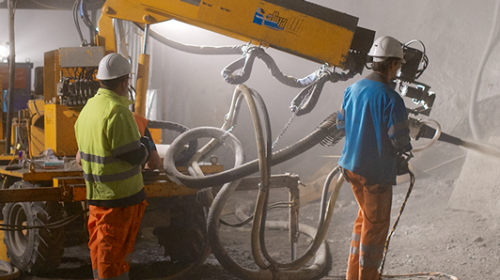Sources: GCP Applied Technologies Inc., Cambridge, Mass.; CP staff
After a World of Concrete preview earlier this year, GCP (Grace Construction and Packaging) has officially introduced the Tytro Shotcrete System, underscoring its potential to make underground construction processes better, faster and more economical against conventional methods and mix designs. It spans GCP’s Strux BT macro-fiber and six Tytro family agents; newest among them is RC, a nanotechnology-derived, liquid rheology control modifier functioning as a pozzolan and silica fume alternative.
| TYTRO SHOTCRETE PHOTO: GCP Applied Technologies |
“The Tytro System provides improved agility and additional capabilities that applicators and global contractors have been demanding for decades,” says GCP Specialty Construction Chemicals President Adam Grose. “Our technical specialists have analyzed the unique challenges of underground construction projects to create customized mix designs, delivering the most optimized and cost-efficient concrete mix for each project.”
The system curtails rebound in shotcrete spraying operations, maintaining rates of 5-8 percent; yields faster early strength and enhanced bonding-to-rock with an increased one-pass thickness build-up; and, enables underground construction professionals to reduce operating costs and minimize excavation downtime without sacrificing performance or relaxing safety standards. Compared to conventional shotcrete mixes and application methods, GCP engineers note, Tytro Shotcrete exhibits up to 10 percent lower installed cost, achieved through mix optimization, waste minimization and shorter cycle times; and, affords faster construction area re-entry times due to more rapid early age strength development at equal accelerator dosage rate.
Joining RC in the new shotcrete system are five companion Tytro agents: WR high-range water reducer; HC hydration control, extending mix working life up to 72 hours; SA, an alkali-free set accelerator formulated to provide high early strength at low dosage rates; AE air entraining admixture; and, RM, a rheology modifier to improve pumpability and spraying sequences.
